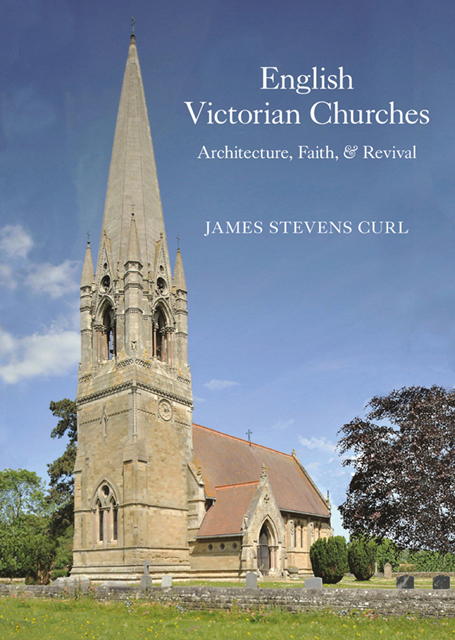Book contents
- Frontmatter
- Dedication
- Contents
- Foreword by Barry Orford
- Preface and Acknowledgements
- Note on Illustrations
- 1 An Introduction to Denominations and Victorian Churches
- 2 Architecture, Antiquarianism, and Styles
- 3 The Religious Atmosphere in the 1830s and 1840s
- 4 Recusants, Goths, Converts, Ultramontanes, and Controversies
- 5 The Anglican Revival
- 6 The Search for an Ideal
- 7 Church Architecture of the 1850s, 1860s, and Early 1870s
- 8 The Late Victorian Anglican Church in Several Manifestations
- 9 Non-Anglican Buildings for Religious Observance
- 10 Epilogue
- Select Glossary
- Select Bibliography
- Index
3 - The Religious Atmosphere in the 1830s and 1840s
Published online by Cambridge University Press: 08 June 2023
- Frontmatter
- Dedication
- Contents
- Foreword by Barry Orford
- Preface and Acknowledgements
- Note on Illustrations
- 1 An Introduction to Denominations and Victorian Churches
- 2 Architecture, Antiquarianism, and Styles
- 3 The Religious Atmosphere in the 1830s and 1840s
- 4 Recusants, Goths, Converts, Ultramontanes, and Controversies
- 5 The Anglican Revival
- 6 The Search for an Ideal
- 7 Church Architecture of the 1850s, 1860s, and Early 1870s
- 8 The Late Victorian Anglican Church in Several Manifestations
- 9 Non-Anglican Buildings for Religious Observance
- 10 Epilogue
- Select Glossary
- Select Bibliography
- Index
Summary
On Sunday July 14, 1833, Mr Keble preached the assize sermon in the University pulpit. It was published under the title of National Apostasy. I have ever considered and kept the day as the start of the religious movement of 1833.
John Henry Newman (1801–90): Apologia Pro Vita Sua: Being a History of his Religious Opinions, Martin James Svaglic (1916–98) (ed.) (Oxford: Clarendon Press, 1967), 43.What is called the Oxford or Tractarian movement began … in a vigorous effort for the immediate defence of the Church against serious dangers, arising from the threatening temper of the days of the Reform Bill.
Richard William Church (1815–90): The Oxford Movement: Twelve Years, 1833–1845, i (London: Macmillan & Co., 1891), 1.Introduction
Upheavals of the 1790s profoundly affected the nation, for the French Revolution, radical ideas, subsequent wars, and the Irish Rebellion of 1798 threatened national security and the established order, leading to several momentous changes. In order to bring Ireland more under control, Great Britain and Ireland were united by enactments passed by both parliaments, which became law on 1 January 1801. Through those Acts the Churches of England and Ireland were also joined, and despite hopes of strengthening Anglicanism, in that union there lay profound dangers, soon all too apparent, that threatened the very survival of the Church.
However, those shoal waters lay ahead, for at the start of the 19th century patriotism, stirred by the great victories at Trafalgar (1805) and Waterloo (1815), was very much alive. There was an upsurge of Anglican activity: promotion of Anglicanism, and the creation of a visible Anglican presence in towns and cities, were primary concerns of constitutional loyalists.
Evangelicals and High Churchmen: The Clapham Sect and the Hackney Phalanx
Evangelicals in London within the Established Church, prompted by the teachings of John Wesley, became influential: they believed in teaching by example, supporting temperance, performing good works, and observing the ‘Sabbath’ (Sunday, in Evangelical Sabbatarian terms) to invigorate the nation’s spiritual life, stability, and moral well-being. In parallel was the emergence of the ‘High and Dry’ party of Sacramentarians which perceived the Anglican Church as having a powerful role in raising the tone of society as a whole.
- Type
- Chapter
- Information
- English Victorian ChurchesArchitecture, Faith, and Revival, pp. 21 - 34Publisher: Boydell & BrewerPrint publication year: 2022



